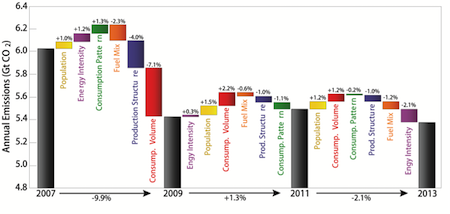GEOG Research Links Global Recession to Reduced Carbon Emissions
College Park, Md. —After decades of steady increases, climate change-causing emissions of carbon dioxide in the U.S. decreased by 11% between 2007 and 2013. Many have assumed that the drop in emissions reflects a shift away from coal energy and towards lower-carbon natural gas made cheap by the hydraulic fracturing boom. However, most of the credit should instead been given to the global financial recession, according to researchers at the University of Maryland, University of California Irvine, and the International Institute for Applied Systems Analysis.
“Carbon emissions are closely linked to economic growth in the sense that the recession helped reduce carbon emissions as it dampened household consumption, which is the main driver of the economy and emissions,” says Klaus Hubacek, professor of Geographical Sciences at UMD and one of the project’s investigators. “This points towards the fact that the more stuff we consume the more we pollute, and the importance of low carbon choices for consumers in achieving lower carbon lifestyles.”
 The study results, which appear June 21 in the journal Nature Communications, are based on economic analysis of energy use and emissions in the U.S. between 1997 and 2013. Between 2007 and 2009, when U.S. emissions plummeted by 10%, there was a substantial decrease in the volume of goods and services being consumed in the U.S. and also a shift in the types of goods and services being produced. The new study finds that, together, these changes in consumption and production account for more than three-quarters of the decrease in emissions between 1997 and 2013, with changes in the mix of fuels used to generate energy accounting for just 18% of the drop in emissions.
The study results, which appear June 21 in the journal Nature Communications, are based on economic analysis of energy use and emissions in the U.S. between 1997 and 2013. Between 2007 and 2009, when U.S. emissions plummeted by 10%, there was a substantial decrease in the volume of goods and services being consumed in the U.S. and also a shift in the types of goods and services being produced. The new study finds that, together, these changes in consumption and production account for more than three-quarters of the decrease in emissions between 1997 and 2013, with changes in the mix of fuels used to generate energy accounting for just 18% of the drop in emissions.
“In our results, natural gas plays a bit part in decreasing emissions. The real heroes are consuming less stuff and using energy more efficiently,” said Steven Davis, assistant professor of Earth system science at UC Irvine and a co-author of the study.
Previous reports have praised natural gas as driving emissions down because burning gas produces roughly half as much carbon dioxide per unit of energy than burning coal. However, the new work shows that changes in how much Americans consumed, what types of products they consumed, the balance of manufacturing and service industries, and the quantity of energy used per dollar of products produced have all been important contributors to the decrease in emissions. Analyzing these different factors, the researchers found that changes in the mix of fuels used have had a comparatively small effect on U.S. carbon dioxide emissions since 2007.
“Cheap gas has only made a small contribution to declining carbon emissions in the US,” Hubacek notes. “At the same time low gas prices make real alternatives such as renewables less economical, and exports of coal to countries with less efficient technologies have been increasing - thus potentially leading to even higher overall emissions. The only winner is to really invest in improving efficiency and the energy mix with a focus on renewables.”
The study concludes that without new policies that limit CO2 emissions, it may be difficult to keep emissions down as the U.S. economy continues to recover. And in fact, U.S. CO2 emissions rose in 2013 and 2014.
“With a growing economy, emissions are likely to increase again. Without appropriate policies in place such as the EPA Clean Power Plan, emissions will probably rise beyond the levels required to reach any reduction targets. Support for such plans can lock-in the recessionary emissions reductions and ensure continued decarbonization of the U.S. energy system,” said Kuishuang Feng, Research Assistant Professor in UMD’s Department of Geographical Sciences and a researcher on the study.
Published on Tue, Jul 21, 2015 - 10:55AM



